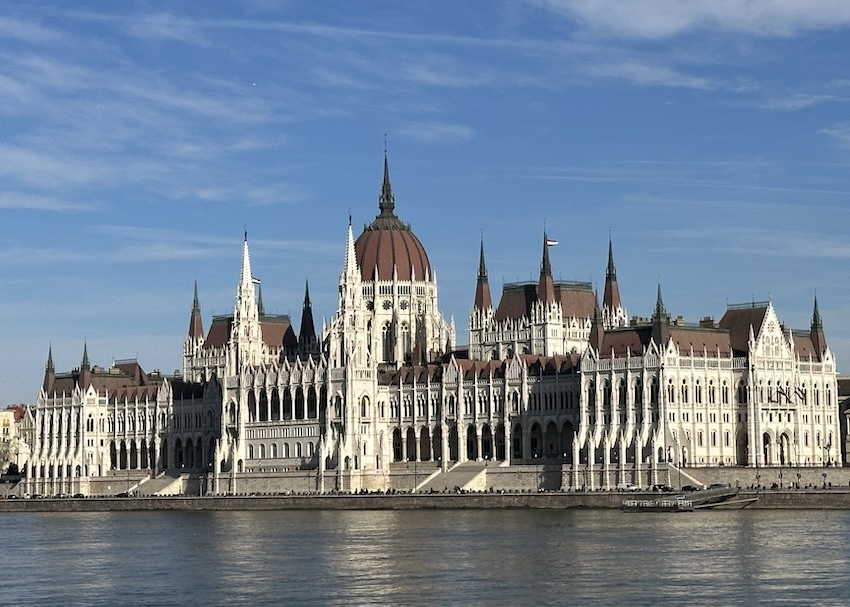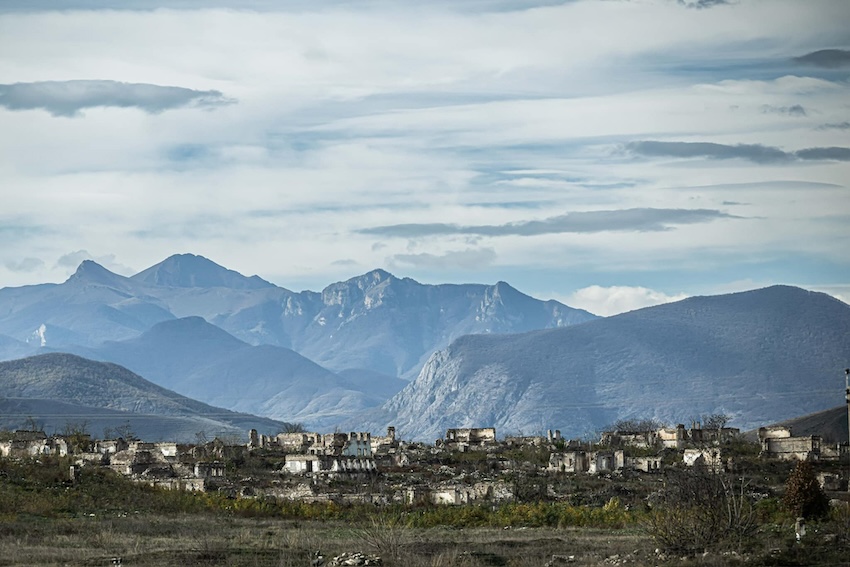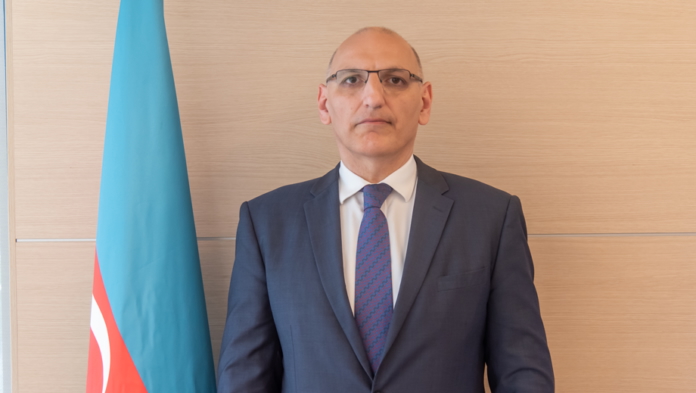Interview with Ambassador Elchin Amirbayov, Special Representative of the President of the Republic of Azerbaijan for Special Assignments
Edited by Anna Popper

Ambassador Elchin Amirbayov, Special Representative of President Ilham Aliyev of the Republic of Azerbaijan for Special Assignments, undertook a working visit to Budapest in early November 2024.
During his visit, he engaged with prominent figures in Hungarian political circles, strengthening bilateral relations and fostering dialogue on key issues.
During his meeting with Péter Sztáray, State Secretary for Security Policy and Energy Security at Hungary’s Ministry of Foreign Affairs and Trade, Ambassador Amirbayov discussed bilateral and EU-related topics. They reviewed the progress of Hungarian-Azerbaijani relations, the dynamic growth of their cooperation and highlighted regular political engagement, particularly the frequent meetings at the highest levels. The discussions also addressed the Azerbaijani-Armenian peace process and broader regional issues, including connectivity, East-West energy and logistics networks, and cooperation within the framework of the Organization of the Black Sea Economic Cooperation (BSEC).


Ambassador Amirbayov’s visit included a meeting with Mr. János Bóka, Minister of EU Affairs, who provided an overview of the main objectives of the Hungarian EU Presidency, with particular emphasis on efforts to enhance competitiveness and strengthen connectivity.


Mr. Sándor Lezsák, Deputy Speaker of the Hungarian National Assembly hosted Mr. Amirbayov at his office.


A meeting also took place with Mr. Balázs Orbán, Political Director of the Prime Minister’s Office.

Additionally, he had a talk with Gladden J. Pappin, Ph.D., President of the Hungarian Institute of International Affairs (HIIA). He also held discussions with leaders of Hungarian think tanks and participated in media interviews to share Azerbaijan’s perspectives and priorities with the Hungarian public.
The Diplomatic Press Agency (DPA) had the pleasure and privilege of interviewing Ambassador Elchin Amirbayov. A distinguished career diplomat, Ambassador Amirbayov, held a variety of significant roles prior to his appointment as the President’s Special Representative for Special Assignments in July 2023, including serving as Azerbaijan’s Ambassador to Switzerland, France, and the Holy See, and as Permanent Representative to the UN Office in Geneva and in Brussels at NATO Headquarters. His expertise spans Caucasian geopolitics, the region’s history, and peace-building efforts.
During the interview, Ambassador Amirbayov shared his insights on the evolving Hungary-Azerbaijan relationship and the ongoing peace negotiations between Azerbaijan and Armenia.
Your Excellency, may I ask what is the main purpose and objective of Your visit to Hungary?
– My trip to Budapest is part of the very active and regular dialogue between Azerbaijan and Hungary. We want our Hungarian friends to be fully informed about the current status and prospects of the peace process between Armenia and Azerbaijan. Hungary is a very important partner for us, and our number one partner within the European Union.

Our bilateral relations are excellent and grow stronger every year, expanding to more areas of cooperation. Hungary’s role as the current rotating President of the Council of the European Union, a function you will perform until the end of this year, adds further significance to this visit.
On 7 November, Hungary is also hosting the major diplomatic event in the history of your country, the 5th European Political Community (EPC) Summit, marking an important milestone. We extend our best wishes to our Hungarian friends for the success of this event.





5th EPC Summit photos from Mr. Balázs Orbán’s Facebook page
Azerbaijan values its relations and cooperation with the European Union, considering it an important vector of our foreign policy. Therefore, it is encouraging that we have established effective communication channels with Hungary, as one of the key EU members. Through Hungary, we also hope to convey certain messages to the broader EU membership.
Have you ever been to Hungary?

– This is my second visit. My first was 30 years ago, in 1994. Interestingly, both visits are connected by major international events. Back then, I came on the eve of the OECD Summit, which was held in Hungary, and now, Hungary is hosting the EPC Summit.
In these three decades, I have witnessed remarkable progress. Budapest is a city rich in history and its modern developments are impressive. I can see the efforts of the Hungarian leadership to elevate the country’s standing. Hungary’s authority and influence have grown significantly during this period, and we are pleased to see this evolution.
Hungary is not only one Azerbaijan’s closest partners, but also a nation with which we share strong emotional and historical ties that unite us. There is a sense of kinship and common values between our peoples. We have similar views on many issues and a shared commitment to the principles and norms of international law.
Excellency, what is Your current responsibility as the President’s Representative for Special Assignments?

– My primary responsibility is to oversee the normalization process of relations between Azerbaijan and Armenia. I am also a member of the negotiating team working on the peace agreement between our two countries.
What is the current status of negotiations on a peace deal with Armenia?
– Negotiations on the draft peace agreement have been ongoing for two years, and we have made significant progress. I can say that we are not far from finalizing the agreement. Currently, efforts are focused on resolving a few remaining issues in the text of the agreement.
Azerbaijan is committed to ensuring that the peace agreement is sustainable and irreversible. This means addressing all obstacles to its implementation. One major hurdle is the territorial claim regarding Karabakh enshrined in Armenia’s Constitution, which has been a fundamental cause of the conflict since its inception. The whole world recognizes Karabakh as part of Azerbaijan, and we expect Armenia to amend its Constitution to align with this reality and the spirit of the peace agreement. The current Armenian government has openly recognizes Azerbaijan’s territorial integrity, including the Karabakh region. Aligning their Constitution with this position is crucial to ensure the durability of the peace agreement.

If the Armenian side manages to amend the relevant segment of its constitution, we will be ready to sign the peace deal as soon as possible. I believe we stand today at a historic moment with a window of opportunity. We are closer to achieving peace than ever before, but the responsibility now lies on their side.
It is vital that we take all necessary steps to ensure that the peace agreement is durable and withstands the test of time. We do not want it to be overturned by a future government. For that, it is essential to resolve the constitutional issue and align the constitution with the peace agreement, ensuring long-term harmony and stability.
Do You believe the peace agreement could be signed this year?

– That depends on how quickly the Armenian side addresses the constitutional issue. If they amend the relevant part of their Constitution soon, there will be no obstacles to finalizing the agreement in the short term. This amendment would require a referendum, allowing the people to express their will on whether they support the achievement of this peace by signing the agreement or want to keep this claim in force. Essentially, it would be a referendum on whether the Armenian people desire to normalize relations with Azerbaijan.
We have seen significant progress in our negotiations and hope that Armenia recognizes the substantial benefits of making peace with Azerbaijan. Such an agreement could pave the way for opening its borders and fostering stability, cooperation and development to both nations.
How do You foresee the outcome of a potential referendum in Armenia?
– It is difficult to predict. However, I hope that the Armenian people, tired of decades of confrontation, will choose peace, stability and security. Clinging to territorial claims will only perpetuate rivalry and conflict, while Azerbaijan is ready to turn the page and live in peace as good neighbours. Peace between our two nations can improve the overall security and stability of the South Caucasus. It can transform the region into a hub of prosperity and bring economic dividends to both Armenia and Azerbaijan.
Thank you for the insights, Your Excellency.
Hungarian Participation in Reconstruction Efforts in Karabakh
Soltanli, a large village in the Jabrayil region of Karabakh, is among the territories liberated and returned to Azerbaijan after the Second Karabakh War in 2020. These areas, constituting roughly 20% of Azerbaijan’s territory, are currently undergoing extensive reconstruction and rehabilitation, with significant investments by the Azerbaijani government aimed at revitalizing these regions. Hungary has stepped forward to support Azerbaijan in this critical endeavour, contributing to the rebuilding of lands devastated by decades of conflict.
In November 2023, the foundation stone for the reconstruction of Soltanli village was laid in the presence of Péter Szijjártó, Hungary’s Minister of Foreign Affairs and Trade. This village, reclaimed by Azerbaijan, will benefit from a project by the Hungarian KÉSZ Group, which, once completed, will enable the return of 5,000–6,000 residents.



Photos from Péter Szijjártó’s Facebook page
The reconstruction efforts will focus on building residential houses, community centres, hospitals, schools, kindergartens and sports facilities. The comprehensive approach aims to ensure that returning residents have access to essential services and a vibrant community life.
The agreement between Baku and Budapest entrusted Hungarian companies with the reconstruction of Soltanli, highlighting a robust bilateral partnership. Mr. Sahib Babayev, Azerbaijan’s Minister of Labour and Social Protection, along with other Azerbaijani authorities, expressed deep gratitude to the Hungarian government for its generous commitment to donate a school to Soltanli.



Photos from Péter Szijjártó’s Facebook page
Education played a pivotal role in Azerbaijani-Hungarian cooperation, as evidenced by the popularity of the Stipendium Hungaricum scholarship program among Azerbaijani students. To further strengthen this partnership, the Hungarian University of Agriculture and Life Sciences (MATE) recently introduced a program offering specialized courses and vocational training for Azerbaijani students in the agricultural sector.
Source: Embassy of Azerbaijan in Budapest
Photos by the Embassy of Azerbaijan in Budapest












